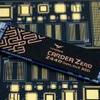Introduction
TeamGroup Cardea Zero Z440 PCIe 4.0 NVMe SSD
The force is strong with this one - breaching the 5 GB/sec marker
We review the TeamGroup Cardea Zero Z440 PCIe Gen 4.0 SSD. It reaches the fastest transfer rates we have seen thus far at 5 GB/sec. Of course it is an SSD you can seat into any PCIe 3.0 compatible PC, however, if you place it into a Ryzen 3000 / X570 based PC, some magic happens as you are running 4000 MB/s numbers and higher, thanks to the new PCIe 4.0 interface and a little TLC from Phison, well Toshiba strictly speaking.
In the past few months, you'll have seen a few PCIe Gen 4.0 related announcements. Of course, the dazzling numbers from SSDs at that speed do impress. Teamgroup released the Cardea Zero Z440 at roughly 27 Cents per GB and you can purchase it in a 1TB and 2TB model, the Z440 units will be available at €269,- and €479,- respectively. Prices in USD seem much better though, $189 and $379.99 respectively for the 1TB and 2 TB models. The specs are great the numbers dazzling, but will this unit deliver what it claims? As filling up the bus with 4 maybe even 5 GB/s speeds, is a difficult challenge. The SSD comes in an M.2 package. Using the PCIe lanes interface it is so much more capable as it can deal with way more bandwidth using PCI-Express lanes Gen 4.0. As such, M.2 solutions are intended for high-end and enthusiast-class motherboards and similarly positioned laptops.
- Max Sequential Read - Up to 5000 MBps
- Max Sequential Write - Up to 4400 MBps
- 4KB Random Read - Up to 750K IOPS (QD32)
- 4KB Random Write - Up to 750K IOPS (QD32)
- Endurance 1TB / >1,800TB 2TB / >3,600TB
- Warranty 5-Years
While the stability and safety of your data have become a number one priority for the manufacturers, the technology keeps advancing at as fast a pace as it does, the performance numbers a good SSD offers these days are simply breathtaking. You get between 450 MB/s to 500 MB/sec on SATA3 which is the norm for a single controller based SSD. In the year 2018 by combining advanced NAND Flash controller with PCIe Gen3 (8Gb/s) x 4, NvMe 1.3 interface and 3D NAND Flash, PCIe M.2 delivers sequential read speed up to 3200MB/s and sequential write speed up to 1500MB/s. It is now 2019, and PCIe Gen 4 NvMe 1.3 is here, offering closer to 5 GB/s performance - ranges and that is factor 10 over the SATA3 SSD.
A couple of years ago a 128 GB SSD was hot stuff, then slowly we moved to 256 GB, last year 512 GB for an SSD in a PC was the norm, this upcoming year we'll transition slowly to roughly Multi-TB SSDs as the norm. With the market being so huge, fierce and competitive, it brought us to where we are today... nice volume SSDs at acceptable prices with very fast performance. We'll inspect the product PCB and components later on in the review in detail. This unit uses vertically stacked NAND (also referred to as 3D NAND) and is now available multiple capacities. With a low power design, this drive will be among the mainstream to fastest SSDs we have ever tested.
The SSD is a Non-Volatile Memory Express (NVMe 1.3) M.2 form factor SSD, it has been fitted with new Vertically stacked NAND (new 96-layer BiCS) TLC. The performance numbers of a proper SATA3 SSD offers these days are simply excellent, but with the more niche NVMe SSDs you can easily quadruple performance, which offers serious numbers. The unit follows a smaller M.2 2280 form factor (8cm) so it will fit on most ATX motherboards capable of M.2 just fine. Anyway, wanna see how fast the Z440 really is? Next page and onwards into the review then.


